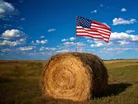Food Insecurity and the 2024 US Presidential Election

The USDA’s annual Household Food Security in the United States report has shown that food insecurity for families across the USA increased in 2023, to 13.5%, the highest level in nearly a decade.
With the 2024 Presidential election less than two months away, we take a closer look at food security in the USA and the track record of the two candidates.
VP Kamala Harris: “Food insecurity is a matter of national security”
Vice President Harris has been a strong advocate for improving food security across the USA, with a particular focus on children and low-income families. She has highlighted that a nation with hungry children risks creating an unhealthy economy.
"When we talk about food deserts, we're talking about places where people don't have access to fresh fruits and vegetables. This is a public health issue, an economic issue and a moral issue," she said.
During COVID-19, Harris introduced:
- Closing the Meal Gap Act of 2020, which expanded Supplemental Nutrition Assistance Program (SNAP) benefits for those going hungry during the pandemic.
- FEMA Empowering Essential Deliveries (FEED) Act, which allowed the federal government to partner with small and mid-size restaurants to offer nutritious meals to vulnerable people.
Earlier in her career, as a senator, Harris was a co-sponsor of the Food Donation Improvement Act, which encouraged food donations by expanding liability protections for the donation of food and grocery products. She also endorsed the Farm to School programme, which unites schools with local farms to give children an understanding of the food chain.
Former-President Trump: “The Big Mac has been a great friend"
Trump Tower in New York City offers a range of options, including upscale casual dining at Trump Grill, quick bites at Trump Café, milkshakes at Trump Ice Cream Parlor and Trump-branded water at the Trump Store.
Donald Trump himself is known to be fond of fast food.
"I think the food is good. I think all of those places, Burger King and McDonald's, I can live with it," Trump said during his 2016 campaign. "We should be eating a hamburger on a conference table and forget the state dinners."
When the pandemic hit, then-President Trump took action to ensure the food supply chain remained ‘safe, secure and durable’. He met with grocery store executives to make sure that they would continue to sell fresh food.
But this effort was impacted by the US-China trade war, which started shortly after Trump took office in 2017. The administration first dissolved the Grain, Inspection, Packers and Stockyards Administration (GIPSA), an independent USDA agency which regulated unfair practices across the livestock, poultry, meat, grain and oilseed industries.
Following this, the trade war went on to reduce US agricultural exports to China, particularly soybeans and pork, which led to a reduced income for many American farmers.
Some products became less expensive due to oversupply in the domestic market, while others became more expensive due to retaliatory tariffs on imported goods.
Whoever wins the November election will be responsible for supporting the two million farms across the USA, while advancing food security for American families, in addition to promoting global food security policies.
******
Make sure you check out the latest industry news and insights at Food Digital.
******
Food Digital is a BizClik brand.
Featured Articles
Fresh investment supports TRACT in enhancing tools for sustainability in the food and agricultural sectors, aligning with EU regulations
The devastating floods in Spain have shaken up the global citrus supply, heightening challenges in the fruit juice drinks market
McDonald's has spent 40 years supporting students with scholarships & plans to continue, despite Robert F. Kennedy Jr.’s plan to Make America Healthy Again





